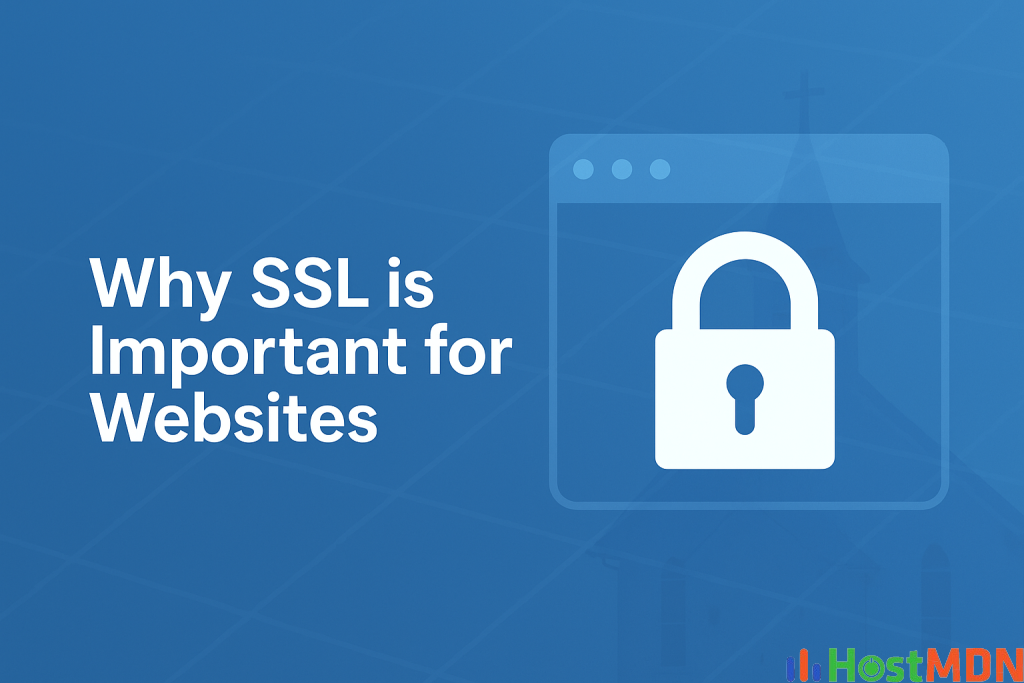Why SSL is important for websites?
In today’s digital age ,website security is no longer optional. Whether you’re running a blog, a business site, or a church website like Fairacres Baptist, ensuring a secure connection for your visitors is essential. One of the most crucial components of web security is SSL, or Secure Sockets Layer.
In this article, we’ll break down what SSL is, how it works, and why it’s vital for every website owner — especially those who collect any form of user data.
✅ What is SSL?
SSL (Secure Sockets Layer) is a security protocol that encrypts the connection between a user’s browser and your website server. It ensures that any information transferred (such as login details, form submissions, or payment information) is protected from hackers.
When your site is protected by SSL, your web address changes from http:// to https://, with the “s” standing for secure. A padlock icon also appears in the browser address bar — a visual sign of trust.

🔧 How Does SSL Work?
Here’s a simplified breakdown of what happens when someone visits your SSL-enabled website:
- The user’s browser connects to your web server.
- The server sends its SSL certificate to the browser.
- The browser checks if the certificate is valid and trusted.
- If verified, a secure and encrypted connection is established.
- All data shared between the browser and server is now encrypted.
This ensures that no third-party (like hackers or malicious scripts) can “listen in” on or alter the communication.
🔍 Why is SSL Important?
1. Protects User Data
If your website collects user input — emails, names, payment details — SSL is critical. Without it, sensitive data travels in plain text, leaving it vulnerable to interception.
2. Boosts Google Ranking (SEO)
Google gives ranking preference to secure websites. In fact, HTTPS is a confirmed SEO ranking factor. That means SSL can directly impact how well your site appears in search results.
3. Builds Trust With Visitors
Modern browsers label websites without SSL as “Not Secure.” This scares users away and reduces engagement. SSL shows your site is trustworthy and safe to interact with.
4. Required for Payment Integration
If you accept donations, sell products, or use payment gateways (like PayPal or Stripe), SSL is mandatory. Payment services will often reject non-SSL sites for security reasons.
5. Ensures Data Integrity
SSL doesn’t just encrypt data; it ensures that it isn’t altered during transmission. This helps maintain the accuracy and reliability of the information exchanged.
⚠️ What Happens if You Don’t Use SSL?Why SSL is important for websites?
Without SSL, your website faces several risks:
- Browsers may display “Not Secure” warnings
- Visitors may abandon your site due to safety concerns
- SEO rankings may suffer
- User data could be intercepted or stolen
- Third-party services like payment gateways may refuse to work
🛠️ How to Install SSL on Your Website
Most modern hosting services offer free SSL certificates via providers like Let’s Encrypt. Here’s a basic guide:
- Log into your hosting control panel (e.g., cPanel).
- Find the SSL/TLS or Security section.
- Choose your domain and click Install Free SSL.
- Wait for the process to complete (usually instant).
If you prefer extra protection and brand validation, you can purchase a premium SSL certificate for additional features like extended validation (EV) or organization validation (OV).
🔐 Types of SSL Certificates
| Certificate Type | Description | Best For |
|---|---|---|
| DV (Domain Validated) | Basic encryption, fast issuance | Blogs, personal sites, church sites |
| OV (Organization Validated) | Adds business verification | NGOs, companies |
| EV (Extended Validation) | Maximum trust, green bar in browser | E-commerce, banks, enterprise |
For most informational or community-based sites like churches, DV SSL is sufficient.
🏛️ Why SSL is Crucial for Churches and Local Organizations
Websites like Fairacres Baptist Church often include forms for event registrations, donations, or membership signups. These forms handle personal information and sometimes financial data.
SSL protects this data and assures visitors that your church or organization values their privacy and security.
Additionally, SSL helps your site appear professional and modern, which is especially important if you’re engaging younger audiences or managing digital outreach.
✅ Final Thoughts
SSL is no longer a “nice-to-have” feature — it’s a must-have for every website. Whether you’re running a church site, small business, or blog, SSL offers:
- Data protection
- Visitor trust
- Higher SEO rankings
- Eligibility for modern web features
If your site is still running on plain http://, you’re not only risking your users’ data — you’re missing out on visibility and credibility.
Secure your site today, build trust, and ensure a safe browsing experience for all.

Comments